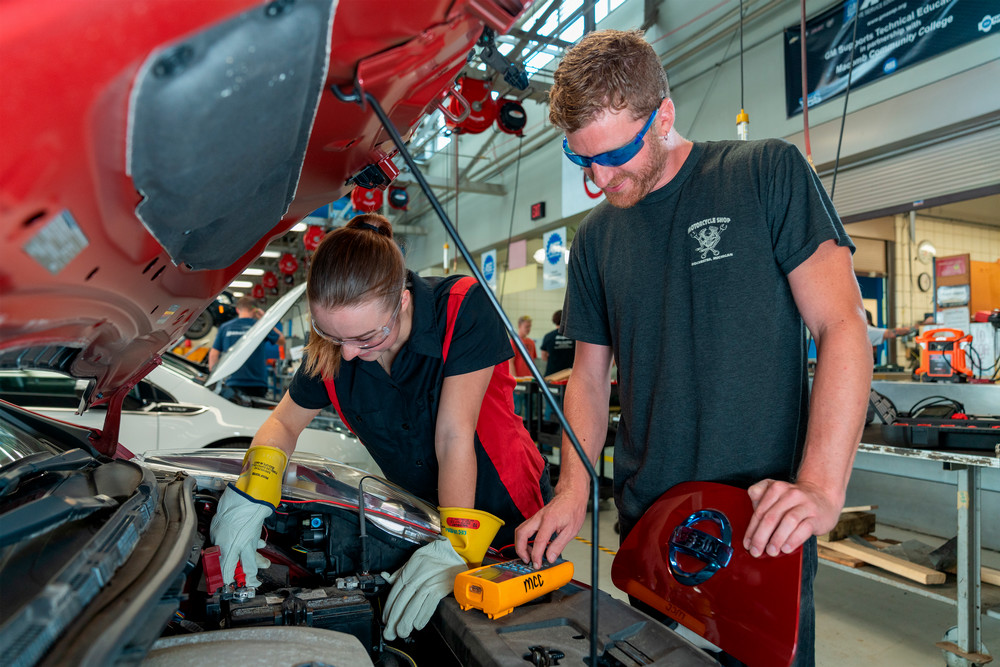Tips to prepare your automobile for winter from the automotive faculty at Macomb Community College
Wednesday, November 20, 2024 09:00 AM

Tips to prepare your automobile for winter from the automotive faculty at Macomb Community College
Winter can be hard on your car or truck. Snow, salt and dangerous driving conditions can all lead to trouble if you are not prepared. The automotive faculty at Macomb Community College has assembled these top 10 tips to help you avoid the winter pitfalls.
Check your tires: Ensure your tires have adequate tread depth, and consider switching to winter tires for better traction on snow and ice..
- Many tire companies recommend that you put your best tires on the rear of the vehicle to prevent oversteering on snow or ice.
- Tire pressure is directly related to temperature. Tire pressure is reduced about 1 - 2 psi per 10 degrees Fahrenheit. Your tire pressure should be set a few psi higher during the winter months.
Test your battery: Cold weather can strain your battery, so make sure it’s in good condition and fully charged.
- Batteries are typically only good for five years.
- Batteries are under higher loads in the winter caused by higher starter draw and thicker engine oil. Ensure your engine oil has the correct winter viscosity.
Replace wiper blades: Install winter wiper blades to prevent snow and ice buildup, ensuring clear visibility.
- Never turn on your windshield wipers if there is snow or ice buildup on the windshield, which can lead to costly repairs of bent or broken wiper arms, blades or even wiper transmission failure. It is best to pull the wiper arms away from the windshield (if applicable) when snow or ice is expected.
- Be careful using ice scrapers on windshields and windows to avoid scratches or damage to weather seals or scratches.
Check fluid levels: Make sure your oil, coolant and windshield washer fluids are at appropriate levels. Use winter-grade oil and antifreeze..
- Your coolant should be tested to ensure it can withstand temperatures as low as -30 degrees Fahrenheit. The most common change interval is typically between 100,000 to 150,000 miles. Always use the owner manual specified coolant.
- Washer fluid can freeze if it has been diluted or is of poor quality, leading to expensive replacement of washer pumps and lines.
Inspect your lights: Ensure all your lights are working properly for better visibility during winter’s shorter days and snowy conditions.
- Older vehicles may develop a glaze on headlamps over time. There are inexpensive renewal kits to help restore headlight luminosity.
Prepare an emergency kit: Include items such as a flashlight, blankets, nonperishable snacks, an ice scraper and jumper cables.
- Small portable jump packs are available that can jump-start an engine with battery or alternator failure. They don’t take up a lot of space and may also serve as a flashlight or a hazard beacon.
Lubricate door locks and weather stripping: Prevent doors from freezing shut by lubricating locks and weather stripping with silicone spray.
- Never wash your car when temperatures are below freezing unless you can completely dry weather strips and seals. Otherwise, broken door handles can make it hard or impossible to open doors.
Check your brakes: Ensure your brakes are in good condition because stopping distances increase on icy roads.
Protect your car’s exterior: Apply a wax or sealant to protect against road salt and moisture.
- Rinse the undercarriage of your vehicle after driving on roads that have been salted. Salt can rust metal very quickly.
Keep your gas tank full: A full tank can prevent the gas line from freezing, provide extra weight for better traction and add to your engine run time if you get stuck in a remote area.
About Macomb Community College
Macomb Community College (www.macomb.edu) is about transforming lives and communities through the power of education, enrichment and economic development. Macomb grants the largest number of associate degrees in Michigan and is the largest community college in the state. The college provides programming for youth through seniors, including early college for high school students, university transfer and career preparation programs, workforce education, continuing education and certification, and a wide range of enrichment opportunities encompassing arts, culture and lifelong learning.
Media contact: Sean M. Patrick, 586.445.7271, patricks28@macmb.edu
